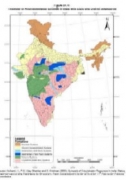 The Eleventh Plan (2007-08 to 2011-12) sought to build on the gains achieved in the Tenth Plan and shift the economy to a path of faster and more inclusive growth. The Mid Term Appraisal (MTA) report for the Eleventh Five Year Plan 2007-2012 by the Planning Commission reviews the experience in the first three years of the Plan and seeks to identify areas where corrective steps may be needed.
The Eleventh Plan (2007-08 to 2011-12) sought to build on the gains achieved in the Tenth Plan and shift the economy to a path of faster and more inclusive growth. The Mid Term Appraisal (MTA) report for the Eleventh Five Year Plan 2007-2012 by the Planning Commission reviews the experience in the first three years of the Plan and seeks to identify areas where corrective steps may be needed.
The Eleventh Plan recognises the special challenges of water resources management facing India and the likelihood that these will grow over time due to the rising population and industrialisation.
This chapter discusses the major features of the water problem facing the country followed by a review of the performance of the schemes dealing with water in the Eleventh Plan. The chapter also proposes an alternative approach to be elaborated into an operational strategy to be implemented in the Twelfth Five Year Plan.
India's water resource problem:
- Current estimates indicate that the water resources available for use in the country are decreasing rapidly. There is also a need to have a much more disaggregated picture, accurately reflecting the challenge faced by each region in the country.
- Use of water in India is characterised by an increasing dependence on groundwater for irrigation.This growing dependence on groundwater has taken the form of unsustainable over-extraction, which is lowering the water table and adversely impacting rural drinking water.
- Issues related to water quality have also emerged as a major concern over the last decade. In addition to biological contamination, chemical pollution of groundwater with arsenic, fluoride, iron, nitrate and salinity has emerged as an important health hazard in recent years.
The schemes implemented under the Eleventh Five Year Plan and a brief assessment of progress in these schemes together with recommendation for improvements have been included in the next part of the chapter and include:
Irrigation through surface water
- Accelerated Irrigation Benefit Programme (AIBP)
- Review of AIBP Performance
- Financial Viability of Irrigation Systems
- The Need for Systemic Irrigation Reform
- The Way Forward for AIBP
Groundwater Development
- Interlinking of Rivers
- Himalayan Water Resources
- Floods and Flood Management
Rural Drinking Water
- Harnessing the Potential of Traditional Systems
- New Strategic Framework for Rural Domestic Water
Urban Water Supply
- Eleventh Plan Initiatives
- Jawaharlal Nehru National Urban Renewal Mission
- Learning from International Experience
- Cleaning our Rivers
The chapter concludes that there is a need to take urgent steps to:
- Protect sources of drinking water both in terms of levels as well as quality
- Protect and rehabilitate traditional water harvesting structures
- Rapidly move towards rainwater harvesting and recharging of groundwater
- Bridge the gap between irrigation potential created and utilised in surface water irrigation projects
- Improve efficiency of water use in AIBP projects through both management and technology innovations
- Improve systems of waste disposal in urban areas
Download the chapter: